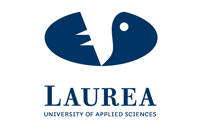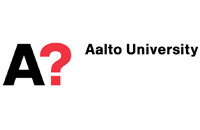Aalto University is a multidisciplinary university where science and art meet technology and business. Our mission is to work towards a better world and create solutions to meet the greatest challenges facing society through top-quality research and pioneering education.
Aalto University has six schools with nearly 20 000 students and 4 500 employees, over 400 of whom are professors. There is a wide variety of bachelor’s and master’s degrees awarded at Aalto University, and we also offer doctoral programmes in all the fields of study.
Aalto University was founded in 2010 as Helsinki University of Technology, the Helsinki School of Economics and the University of Art and Design Helsinki were merged. The main campus is located in Otaniemi in Espoo, Finland. The other campuses are in Töölö and Arabia in Helsinki.
Laurea University of Applied Scienves provides the project with expertise of studying health care and welfare services, service processes and structures, and Living Lab methodology in developing a robotic support ecosystem. Laurea’s team’s expertise represents health sciences and behavioral sciences. They will focus on identifying the daily activities of elderly people, in which robotic support could be useful, on developing robotic support with and for users, and studying on the possibilities of how to renew social and health care services, processes and structures involving all the stakeholders.
The objective of Lappeenranta University of Technology, LUT Lahti in the ROSE research is to investigate the societal and systemic level of service robotics as well as service robot integration in the renewal of welfare service systems. Service robots are examined from the point of view of systemic innovation, and analysis is made on co-evolution of technological and service innovations in the context of service robotics, as well as on the wide-ranging socio-technological transition in welfare services, where increasing use of service robots is a major trend.
LUT investigates the service robot innovation ecosystem to identify the actors and dynamics of the ecosystem, analyzing facilitators, barriers and critical points in diffusion of service robotics, in questions related to, for instance, knowledge management and competence needs.
LUT also analyzes innovation methods to facilitate managing the uncertainties related to the embedding processes of service robotics. The research also gives understanding on what kind of innovation policy can support the co-evolution of services and technologies in the service robot innovation ecosystem.
Research data comprises, inter alia, interviews and surveys for service and technology providers, decision-makers and other stakeholders as well as various strategy documents and other written materials. In addition, empirical field studies are conducted in organizations utilizing service robotics.
Lappeenranta University of Technology, LUT Lahti is a multi-disciplinary regional research unit consisting of about 30 researchers and developers from two Schools, LUT School of Business and Management and LUT School of Energy Systems.
Department of Signal Processing is part of the Faculty of Computing and Electrical Engineering. The department is the largest unit in Tampere University of Technology (TUT) and has been chosen as one of the strategic fields of TUT. The research in the department spans all fields of signal processing, signal processing theory, speech and audio signal processing, image and vision processing, and their applications.

The School of Social Sciences and Humanities in the University of Tampere focuses on the relationship between the society, institutions and individuals. This offers a social and philosophical research environment regarding robotics and its implementation in welfare services. We study service robots from the users' perspective focusing on expectations, challenges and critical dimensions. The strengths of philosophical research include the critical theory of society, ethics of robotics, human-robot interaction, the philosophy of embodiment, and aging and dignity. The strengths of social sciences are in sociological theory of technology, sociology of work, care research, interaction studies and renewal of welfare services.
VTT Technical Research Centre of Finland Ltd is the leading research and technology company in the Nordic countries. We use our research and knowledge to provide expert services for our domestic and international customers and partners, and for both private and public sectors. We use 4,000,000 hours of brainpower a year to develop new technological solutions. VTT in social media: Facebook, LinkedIn andTwitter @VTTFinland.





